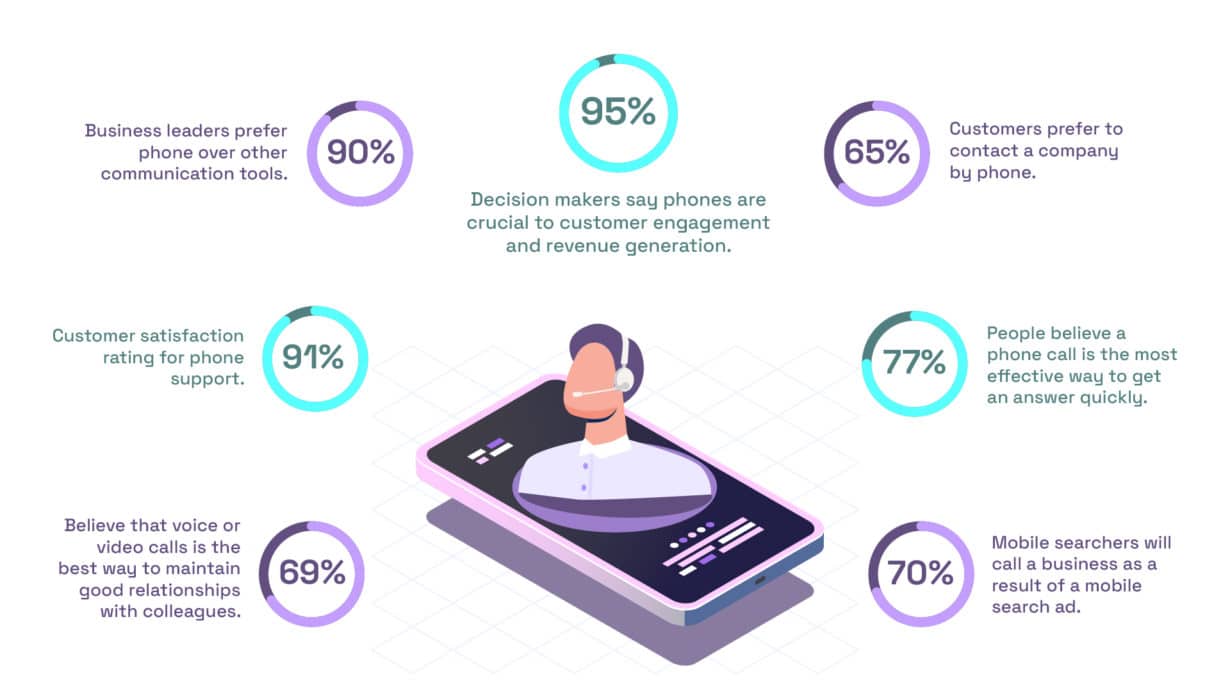Why Voice Communication is Still a Vital Business Tool
Businesses have more communication tools at their disposal than ever before, but voice communication is still the optimal way to deliver your message.

Despite huge advances in communications technology, at 52%, the phone is still the most used communications tool in business. Voice networks remain an integral part of the tech stack in every business, particularly smaller businesses. While 78% of consumers start transactions through multiple channels, many go on to complete the transaction over the phone. Why? Because, while email and chatbots are fine for simple issues, the fastest way to get the answer to a more complex query is still to pick up the phone and talk to a human.
Here are some other statistics that demonstrate the power of voice communication:

The power of personal connection
Every company is in the business of forging strong personal relationships with partners, colleagues and customers. This is key to business success and, in the case of customers, vital to create business opportunities, foster loyalty and drive repeat business. A phone call might not be as effective as an in-person meeting, but it’s the next best thing: voice communication is more effective than email and less frustrating than a chatbot.
One study found that 38% of meaning in a conversation in carried by tone of voice. Voice embodies warmth, empathy, professionalism and persuasion – all qualities that can go a long way to closing a deal or keeping a customer. Asynchronous communication such as email involves waiting for a response and if any part of the email isn’t clear, there is the potential for a misunderstanding.
Here are some other reasons why voice communication is more effective when it comes to doing business:
Voice is efficient and productive
Long chain emails can be confusing and time-consuming. A well-timed phone call can expedite a solution to a problem without re-reading emails or conduct a productive brainstorming session and reach consensus quickly. Another great advantage is the immediacy of response – critical in customer support scenarios, or in collaboration between team members, reducing misunderstandings and the potential for error.
Voice communication closes more sales
Every business needs sales to survive and voice communication is crucial in progressing leads and sealing the deal. That’s because, not only can you use tone, pace and patter to influence and persuade, you can answer questions, resolve concerns and build rapport in real-time. Sales reps can use their skills much more effectively on a call than in email, tailoring the pitch in line with questions and responses from the purchaser. No other sales channel converts more.
The human touch
In a world brimming with technology, voice is a reminder that there are real people behind every interaction. People don’t want to deal with machines; they want to deal with other people. Providing a human touch is one of the simplest and most effective ways to give your business a USP. A conversation by voice leaves a lasting impression. Our brains are wired to remember auditory information better than written information.
Voice technology is still evolving
While voice technology has been around a while, it hasn’t stood still; it continues to evolve offering more functionality for businesses to leverage. Whether working from home, or in the field, mobile voice technologies keep employees productive and connected wherever they are.
The growth in video-calling services has helped too. At a time when two-thirds of those working from home feel isolated, voice and video communications are providing a much needed connection – not just for work, but for mental wellbeing.
While VoIP is still ideal for small businesses, enterprises and those with more complex needs are moving to Unified-Communication-as-a-Service (UCaaS), with advanced features and functionality that meets their unique business needs.
And the rise of AI, 5G and voice-activated hardware continues to bring new applications to the table.
Practical considerations
With the PSTN switch off looming (BT will terminate the service in December 2025), many businesses will be looking at upgrading their voice systems to something that will meet their needs into the future. The latest cloud-based voice technologies offer additional advantages in terms of flexibility, scalability and functionality, with AI-powered tools and automation leading the way.
There are efficiencies to be gained through lower operating costs, as a result of the elimination of hardware. Furthermore, many service providers offer bundled unified communication solutions that include voice, messaging, video conferencing and other applications. Cloud voice capabilities can also be added to existing tools such as Microsoft Teams.
Then there’s the added benefit of being able to add services such as virtual phone numbers to create an international presence without the need for overseas premises. Voice solution providers can also integrate security and reliability with fallover mechanisms, state-of-the-art encryption and compliance tools.
Put the power of voice and phone to work for your business
Even in a world where new communication technologies are emerging and evolving, voice communication remains relevant and critical to business success. Investing in the latest voice solutions gives businesses the flexibility to compete, reduce costs, boost productivity and improve the experience both for your people and your customers.
Talk to DigitalWell for a voice solution that meets your business needs now and for the future.


